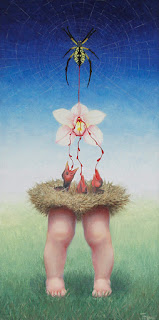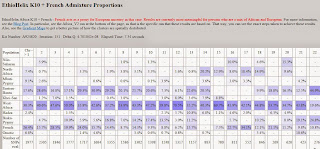Happy Holidays everyone! As
much as I dislike the expression “Happy Holidays” (not personal
enough for me) it is the most expedient way of addressing all of the
holidays we celebrate at this time of year. With Thanksgiving, we
gave thanks for what we have already received... the blessing of
friends and family and prosperity of the previous year. With the
upcoming Christmas and New Years, beyond all of the shopping,
travelling and holiday festivities, we are anticipating the birth of
Emanuel, God with us, and the blessing that will bring, but how do
you receive Emanuel, especially since we prepare for this every year?
What makes this Christmas, this Noel any different or more special
than the many others we've celebrated in the past? How will you
receive the presence of God this year?
Matthew 8:5-8:13
“And
when he was entered into Capernaum, there came unto him a centurion,
beseeching him, and saying, Lord, my servant lieth in the home sick
of the palsy, grievously tormented. And he saith unto him, I will
come and heal him. And the centurion answered and said, Lord, I am
not worthy that thou shouldest come under my roof; but only say the
word, and my servant shall be healed. For I am a man of authority,
having under myself soldiers: and I say to this one Go, and he goeth;
and to another, Come, and he cometh; and to my servant, Do this, and
he doeth it.
And
when Jesus heard it, he marvelled, and said to them that followed,
Verily I say unto you, I have not found so great faith, no , not in
Israel....
And
Jesus said unto the centurion, Go thy way as thou has believed, [so]
be it done unto thee and the servant was healed that very hour.”
Genesis 18:1-15
“And
the Lord appeared unto him in the plains of Mamre: and he sat in the
tent door in the heat of the day; and he lifted up his eyes and
looked and, lo, three men stood by him; and when he saw them, he ran
to meet them from the tent door, and bowed himself toward the ground,
and said, My Lord, if now I have found favor in thy sight, pass not
away, I pray thee, from thy servant. Let a little water I pray you
be fetched, and wash your feet, and rest yourselves under the tree:
and I will fetch a morsel of bread, and comfort ye your hearts; after
that ye shall pass on: for therefore are ye come to your servant.
And thy said, So do, as thou hast said.
And
Abraham ran unto the herd, and fetch a calf tender and good, and give
it unto the young man; and he hasted to dress it. And he took
butter, and milk, and the calf which he had dressed, and set it
before them: and he stood by them under the tree, and thy did eat.
And
they said unto him, Where is Sarah thy wife? And he said, Behold in
the tent. And he said, I will certainly return unto thee according
to the time of life, and lo, Sarah thy wife shall have a son. And
Sarah heard it in the tent door, which was behind him.
Now
Abraham and Sarah were old, and well stricken in age; and it ceased
to be with Sarah after the manner of women. Therefore Sarah laughed
within herself, saying, After I am waxed old shall I have pleasure,
my lord being old also?
And
the Lord said unto Abraham, Wherefore did Sarah laugh, saying Shall I
of a surety bear a child, which am old? Is anything too hard for the
Lord? At the time appointed, I will return unto thee, according to
the time of life, and Sarah shall have a son.Then Sarah denied,
saying I laughed not; for she was afraid and he said, Nay: but thou
didst laugh.
Admittedly, these are not
your typical Christmas passages, but they are two very different
examples of how people, myself included, receive the presence of
God...one with feelings of unworthiness and shame, the other with
great joy and celebration.
In the first example, the centurion
sees and meets Jesus and “beseeches” Jesus to heal his servant of
the palsy. “Beseech” in Merriam-Webster's dictionary is defined
as, “to beg for urgently or anxiously; to request earnestly:
implore. Implore is
defined as, “to call upon in supplication; to call or pray for
earnestly: entreat. Entreat
is defined as, ”negociate; plead. So it is safe to say that the
centurion cared greatly for his servant and that his was a
whole-hearted, urgent plea... not a passing request, for the healing
of his servant.
Jesus, in his love and mercy, agrees to come to the centurion's home
and heal the servant, but the
Centurion refuses Jesus entry to his home, stating that he “is not
worthy” to have Jesus under his roof, and instead, he tell Christ
to “just say the word, and my servant shall be healed”. Jesus
commended him for his faith and goes on to chide Israel for not
having that level of faith, which is true, they didn't have faith in
Him, but I wonder, was this the best way to receive the presence of
God?
In Genesis 18, Abraham sees the Lord, which some call the
Christophony or the pre-incarnate Christ,1 on the plains
of Mamre. When he sees the Lord, Abraham requests that they “pass
not away” and invites the “three men” to take bread and water,
rest under a tree and washes their feet. He has his servants prepare
a feast for them... killing a tender calf and serving milk and
butter. The “three men” (could this be the godhead?) stay and
bless him and his household and promise that Abraham shall have a
son by his wife Sarah, who was past her child-bearing years... and
they do all this without Abraham asking for anything. The Lord saw
the need, and fulfilled it beyond Abraham's wildest dreams, promising
what naturally was not physically possible.
I understand the Centurion's feelings of unworthiness. In reality,
none of us are worthy of God's blessings, “for all have sinned,
and fall short of the glory of God [Rom. 3:23] and if we say that we
have not sinned, we call God a liar and the truth is not in us [1Jn
1:10] for it is not possible for God to lie [Heb. 6:18], but should
this feeling of shame... which some call “Bread of Shame”, stop
us from seeking the presence of God?
Should we allow our unworthiness to separate us from our savior, the
one who was unjustly persecuted, unjustly prosecuted and viciously
crucified... in order that we might have communion with our Creator
and heavenly Father... the one who came to reconcile us back to God?
God forbid! What then would be the reason of his suffering and the
price He paid for us? What then would be the benefit of His blood
shed for us... it would be of no value... again, God forbid! When
Jesus was crucified, the curtain in the temple that separated the
people from the Holy of Holies was torn from end to end [Matt. 27:51]
exposing and reuniting God with his people. God was no longer
shrouded behind a heavy curtain with the fear of death if they came
near unworthy. They, and we today, can come boldly to the throne of
Grace [Heb. 4:16] without fear, without dread and enjoy the presence
of the Lord, like Abraham did on the plains of Mamre with joy and
celebration and with anticipation of Emanuel, God with us, supplying
all our need... the need we are aware of and the need we haven't the
courage to speak.
This Christmas, my sincerest prayer for myself and for all, is that
we shed our shame and feelings of unworthiness so that we may truly
be able to celebrate God with us and all that the blessing of His
presence brings. Have a very Merry and Blessed Christmas and a Happy
and Prosperous New Year!
Love to all...
From,
Felicia V. Gaddis
Creator of Ikthos








.jpg)


